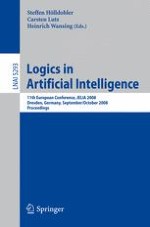2008 | Book
Logics in Artificial Intelligence
11th European Conference, JELIA 2008, Dresden, Germany, September 28-October 1, 2008. Proceedings
Editors: Steffen Hölldobler, Carsten Lutz, Heinrich Wansing
Publisher: Springer Berlin Heidelberg
Book Series : Lecture Notes in Computer Science
